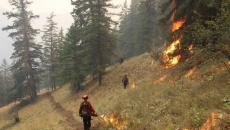VANCOUVER - British Columbia is enduring a record-breaking dry spell, but farmer Amir Mann says the drought is far preferable to other recent weather extremes.
"You can always apply more water, but it's hard to get rid of water," he said, referring to B.C.'s historic floods last November.
Mann and others involved in agriculture say the downside of the drought, which has required some crops to be irrigated, is offset by benefits such as a longer harvesting period and little rot.
BC Agriculture Council presidentStan Vander Waal said fall's dry spell had been useful to many farmers, after a wet spring.
"There's nothing better than having a dry fall for farmers to get crop out of the field and to manage crops," he said in an interview.
"We had very adequate moisture, actually a little too much in the beginning. As long as they can get enough cover on the crop before the conditions start drying up, the moisture will retain enough to finish the crop off."
Mann, who runs Mann Farms in Abbotsford, harvests a variety of crops including strawberries, raspberries, blueberries, pumpkins, corn, gourds, squash and grapes.
"Because it's been so dry, we have very little rot and the quality is amazing," he said, pointing to his pumpkin crop as an example.
"It's beneficial in regard to having no fungus and we don't have to spray pesticides. It's the end of the season and what we've noticed is the pumpkin quality has been exceptional — nice, hard pumpkins (that are) bright orange, the stem is nice and strong, and there's very little fungus."
However, he said, irrigation is essential. Farms without sophisticated irrigation systems, that instead rely on rain to water their crops, have likely fared worse, he added.
Sean Smulker, an associate professor in the faculty of land and food systems at the University of British Columbia, said the impacts of a drought depend on its timing in the crop production cycle.
"What farmers are looking for is the total number of productive days over the summer period, and if it's been impacted in the beginning or the end, that's shaving away from that productivity and potentially impacting their yields and profitability," he said.
"Ideally, you'd be dry on both ends (of the season) and you'd be able to compensate much easier with some irrigation."
Vander Waal said he doesn't foresee any major long-term impact on agriculture unless the drought extends through the winter, which is too early to predict.
"Our biggest concern would be what's going to happen over the winter. The snowpack is critical in that it provides irrigation water for a lot of areas," he said.
Vander Waal noted that government-imposed water restrictions could be a concern in some areas of the province, saying farmers should be prioritized.
"If we want to keep the food supply alive, we also need to make sure we have water for the food supply," he said.
Mann said there are risk mitigation strategies farmers should adopt to prepare for extreme weather events. For instance, he said unfavourable strawberry yields led to the farm finding an alternative growing option: a strawberry greenhouse, which now allows the farm to harvest berries for 10 months of the year.
"Price fluctuations, market conditions and costs are all ever-changing, weather is always ever-changing, so as a farmer, you have to be able to provide either a consistent crop or high quality and you can't do that based off the weather that we're having. You have to be able to just do something a little bit above and beyond," he said.
Smulker said farmers are working to "build farm resilience" to extreme weather events caused by climate change, including improved drainage and irrigation systems.
"Certainly there are a suite of technologies that can be deployed to make the farming system more efficient terms of labour, in terms of nutrients, and those all helped build resilience as well," he said.
Vander Waal agreed, adding that the government should also adopt a more sustainable water storage system.
"In agriculture, the key to success is ultimately recognizing that these climate change events are real, and they continue to happen. So, if we recognize the fact that we have surplus water at certain times of the year, the importance is to make sure we're storing that water so we can use it when we need it," Vander Waal said.
"There's this balancing act, and this is where government, from a policy point of view, can really, really can help."






